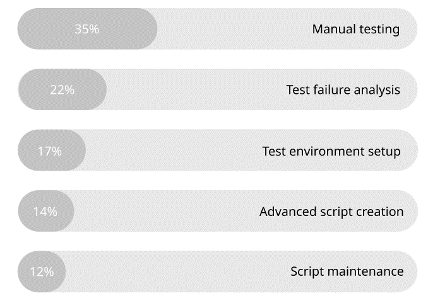This is the first in a two-part series on quality assurance automation. This part outlines the role of quality assurance and the benefits of automation for businesses. Part two highlights how ArganoConnect uses QA automation to accelerate the testing process.
Automation is powering innovation across the entire enterprise landscape, and one area of its increasing importance is quality assurance.
Between 2022 and 2027, the automated testing market is set to expand by 117%, reaching $52.7 billion by the end of the 5-year period.
What is QA automation?
Before we discuss QA automation, let’s define quality assurance (QA). Quality assurance is a process that benchmarks products and services to a predetermined set of quality standards. This helps organizations (1) increase customer satisfaction, (2) limit costs associated with process improvement, and (3) highlight potential problems with products and services.
More broadly, quality assurance is implemented to ensure compliance with industry standards as well as any government regulations.
Like a sculptor chiseling away at a block of ice, quality assurance chips off the rough edges and imperfections of products and services, helping to maintain a certain level of consistency and quality.
Quality assurance automation is a technology-driven approach that is used to verify pre-defined standards of a system by automating the testing of software and mobile applications. By using automation tools (such as Selenium, LambdaTest, and Testsigma) it removes much of the manual and repetitive tasks involved in the process.
And this, manual testing, is the number-one most time-consuming activity of human QA testers, according to Perfecto.io.

Source: Perfecto.io
More than one-third of QA testers say that the most consuming task of their job is manual testing. Like many time-intensive tasks, humans are prone to making errors – an influencing reason why automation is brought into the picture. The second most time-consuming task (22%) is test failure analysis, which is a process that dissects a failed test case and analyzes what went wrong.
The third most time-consuming task (17%) is test environment setup, which is when the QA analyst sets out the software environment onto which the tests will be done. This is followed by advanced script creation (14%) that outlines the description of actions that are needed to perform and test. And lastly is script maintenance (12%), which is carried out to develop a collection of reusable test scripts. When a test is created, it needs maintenance every single time the software application changes.
Hundreds and thousands of variables are involved across these QA activities. And this means that it’s highly probable that humans carrying out these activities will make mistakes and errors. An all too human problem.
Enter automation…
Why is QA automation important?
Automation optimizes the quality assurance process and helps to increase efficiency while driving down costs and time to delivery.
Automated testing eliminates the need for the manual aspects of testing, which is time-consuming and prone to error. Automation is also able to test more scenarios within a shorter amount of time than manual testing, helping organizations release more reliable, high-quality software at a faster rate.
Additionally, QA automation allows organizations to test frequently, which allows any bugs to be identified and fixed quickly in order to maintain the quality of the product.
We can distill three benefits of QA automation:
1. It reduces costs. By automating quality assurance tasks, organizations are able to significantly reduce costs, given that a high percentage of verification is automated.
2. It enhances efficiency. Automation improves the testing process by providing almost instantaneous feedback on the performance of a system. This helps developers quickly identify and address any potential problems.
3, It increases quality. Automated QA procedures can identify issues earlier on in the development process, which helps prevent them escalating and can reduce the costs that are associated with resolving them.
As automation sweeps across the business landscape, QA analysts are increasingly automating aspects of their processes. Today, QA automation has become a critical component of software development and delivery.
In the software development space, QA automation is used in the production process to enhance the levels of a system’s performance, reliability, safety, and ultimately, quality.
We understand the value and impact that QA automation has on the development process. That’s why Argano implements automation in our quality assurance process.
Read how we implement QA automation for our clients.
Facts about QA automation
- 82% of companies are already using or plan to use automated testing to improve their software testing processes. [TestFort QA Lab]
- 65% of companies with automated testing reported improved accuracy and speed of software testing. [TechWell]
- Automated testing saved organizations an average of 59% total testing time. [Infostretch]
- 78% of organizations said automated testing improved their product quality. [Spirent]
Are you looking for the benefits of automating your quality assurance process? Or simply want to know more about how it can benefit your business?






